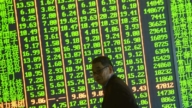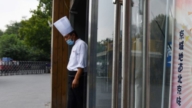【新唐人2014年04月04日訊】日前,一份報告顯示,去年,中國五大國有銀行的「新增不良貸款」總額,達到468億3100萬元,是前年(2012年)的3倍。而去年五大國有銀行的「債務減記」規模,高達人民幣590億元,比前年增長120%,創下十年來最高水平。那麼,造成中國銀行業不良貸款攀升的原因是甚麼?銀行不良貸款、和債務減記規模飆升,預示著甚麼?另外,中國經濟增速的放緩,對債務重重的銀行業,是否雪上加霜?我們來聽聽專家的分析。
據《騰訊財經》網站4月2號報導,去年,大陸12家上市銀行的年報數據顯示,中國五大國有銀行的「債務減記」規模高達人民幣590億元,比2012年增長120%,創下十年來最高水平。
而美國《華爾街日報》3月31號刊文說,中國最大的五家國有銀行,去年加大了壞賬沖銷力度,據推算,去年這五家銀行沖銷和轉移到表外的「不良貸款」,共計人民幣639億2000萬元(合105億美元),是2012年沖銷規模的2.5倍。
美國南卡羅萊納大學艾肯商學院教授謝田:「減記規模飆升,或沖銷壞帳越來越多,說明中國這些國有銀行的經營遇到了極大的麻煩。」
這五大國有銀行,分別是中國工商銀行、中國建設銀行、中國農業銀行、中國銀行和中國交通銀行。
美國「南卡羅萊納大學艾肯商學院」教授謝田表示,由於國有銀行大規模的放貸,大筆的資金都進入到不良的貸款和壞帳裡,使國有銀行去年下半年就出現了流動性危機的「錢荒」。
去年的中國財報顯示,五大銀行去年「新增不良貸款」總額,達到468億3100萬元。而前年(2012年) 的「新增不良貸款」僅109億5200萬元。
不少投資者認為,由於國企管理的不透明,五大行的不良貸款或許要比官方數據高出許多。
「中行」行長陳四清對外表示,今年有27%地方融資平臺類的貸款到期,而產能過剩行業的貸款為1,885億元。這是否預告了將有更多的放貸款無法收回﹖陳四清說,今年將高度關注地方融資平臺、和產能過剩行業,以及房地產行業,這三大類貸款的資產質量。
謝田表示,銀行的收入是從存、貸款人民幣差上來的。
謝田:「中國實質上,民間消費貸款一直沒有增大很大的規模,大部分都是企業貸款,而企業貸款,隨著中國經濟走向停滯、或產業過剩,許多產業倒閉,再加上現在房地產泡沫破滅,這些貸款都變成了呆賬,這就是這些壞帳增加的原因。」
據媒體報導,中國GDP增速從2007年的13%,下滑到2013年的7.7%。今年2014年第一季度的GDP,可能會降到7.3%左右。
《華爾街日報》說,經濟增速放緩,拖纍了很多公司償付債務的能力。
中國國內公司債市場3月份出現首例違約,總部位於上海的「超日太陽能科技股份有限公司」,未能償付人民幣8,980萬元的利息。
此外,房地產開發商「浙江興潤置業投資有限公司」表示,公司無法償還6億美元的銀行貸款。
大陸金融分析師任中道:「一旦回收不了了這個貸款,(銀行)它就要從它所謂的利潤中衝消掉,對銀行的衝擊首先就是利潤減低,中國經濟如果下滑的更加嚴重,那銀行的不良貸款就會不斷的增多。」
大陸金融分析師任中道表示,銀行還將承受隨之而來的資產貶值,進而陷入危機。
《騰訊財經》指出,經濟增速放緩,銀行業不良債務減記規模大幅攀升,預示著中國銀行業的經營壓力將會增大,金融環境惡化。
私募股權顧問公司Towson Capital的合夥人傑弗里•道森(Jeffrey Towson),和「麥肯錫全球研究院」亞洲區董事喬納森•沃澤爾(Jonathan Woetzel),日前撰文說,大陸銀行業正面臨著前所未有的壓力,一場巨大的金融風暴即將爆發。
採訪編輯/易如 後製/李勇
China´s Bank Industry In the Eye of the Storm
Recently, a newly released report revealed that in last year,
“newly added bad loans” of China´s five state-owned banks,
reached 46.831 billion RMB (US$ 7.4 billion),
three times that of 2012.
The debt write-downs (reduction in book value of assets)
of five banks,
are up at 59 billion RMB, an increase of 120 percent
comparing it to2012.
This makes it the highest on record in the
last decade.
So what´s the reason for soaring bad loans in China´s
bank industry? What does the situation indicate and mean?
In addition, will the slowing down of the Chinese economy
aggravate the bank industry with serious debts?
Let´s follow the experts´ analysis.
According to Tencent´s Financial website report on Apirl 2,
the annual report of 12 public listed banks in Mainland
China last year,
revealed debt write-downs of China´s largest
five state-owned banks,
had reached 59 billion RMB with an annual
increase rate of 120 percent.
This takes it to its highest levels in the last decade.
US-based Wall Street Journal reported on March 31,
China´s five largest state-owned banks are to strengthen
their efforts on offsetting bad loans.
It is estimated that the bad loans written down and moved
beyond the financial sheets,
had reached 63.92 billion RMB (US$10.5 billion),
as much as 2.5 times more than that of 2012.
Professor Frank Xie from the School of Business Administration,
University of South Carolina Aiken:
“The soaring write-downs and offsetting of more bad loans,
indicates Chinese state-owned banks,
are experiencing major issues within their operations.”
These five state-owned banks include, Industrial and Commercial
Bank of China (ICBC),
China Construction Bank (CCB), Agricultural Bank of China (ABC),
Bank of China and Bank of Communications.
Prof Xie says, due to offering large-scale loans
from these state-owned banks,
huge amounts of money becomes bad loans and bad debts,
which then produces the “money famine” or liquidity crisis
occurring among state-owned banks in the last half of this year.
China’s state financial report from last year, shows that
five banks have a total “newly added bad loans”
of 46.831 billion RMB,
yet when compared to 2012, it was 10.952 billion RMB.
Many investors think, considering the opaque management
of state-owned enterprises in China,
the bad loans of these banks, may well be much higher
than the official data given.
The CEO from the Bank of China Mr Chen Siqing expresses,
around 27 percent l of all local governmental financing
platform loans, will expire this year,
and loans for the industrial sector, will be in excess production
capacity of 188.5 billion RMB (US$ 30 billion).
Does his saying indicate that there will be more loans that
are going to be difficult to retrieve?
Chen Siqing says, in this year alone, the assets exist within
three loan categories,
including local governmental financing platform, industries with
excess capacity and property the development industry,
all of these sectors will be closely watched over in the
ensuing months ahead.
Prof Xie says, the revenue of banks come from the interest gaps
between deposits and loans.
Prof Xie: “But essentially, non-governmental loans
have not yet been developed into a vast quantity.
A considerable amount come from the loans of enterprises.
However, along with the stagnant status of China´s economy
or excess capacity of some industries, many enterprises go bust.
In addition to the broken bubbles of the property industry,
all of these loans will become dead accounts, which is the
main reason for the increase in bad debts.”
According to media reports, the increase rate of China´s GDP
(gross domestic product),
has slowed down from 13 percent in 2007 to 7.7 percent in 2013.
In the first quarter of 2014, the GDP increase rate might well
be further reduced to around 7.3 percent.
Wall Street Journal reported, the slowing down of the economy,
will impact upon the capability of repaying debts of many companies.
The first contract-breaking case, happened in China´s company
bond market in March.
Shanghai Chaori Solar Energy Science & Technology
Company Ltd,
was unable to repay the interest of its bond,
with an amount owing of 89.8 million RMB.
In addition, Zhejiang Xingrun Real Estate Company,
as a real estate developer,
says their company cannot repay the bank loan
of 600 million US dollars.
Mainland financial analyst Mr Ren Zhongdao:
“Once the loans can not be returned,
then the banks will have to offset them from their profits.
So the impact upon the bank, will be to first reduce the profits.
If China´s economy goes further down in to dept,
then the bad loans will be much worse.”
Ren Zhongdao says, banks will also bear the consequent
devalued assets and hence be plunged into crisis.
Tencent Finance points out, slowing down the economy, largely
produces the rising of write-downs of bad debts,
which indicates, the operation stress of China´s banking industry,
will increase and the financial environment will deteriorate.
Private equity consulting company Towson Capital´s partner
Jeffrey Towson and Mr Jonathan Woetzel of Asia Director
of Mcikensy Global Institute, jointly published an article,
which says, bank industry in Mainland is facing unprecedented
stress and a massive financial storm is forthcoming.
Interview/Yi Ru Post-Production/Li Yong




























